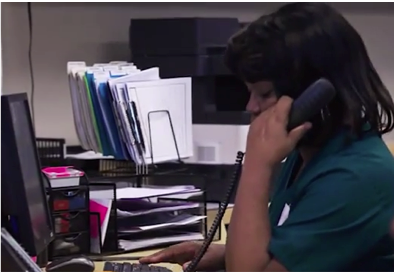We’ve all been to the doctors’ office at least once in our life but many people are not familiar with the inner workings of a medical office. For many of us, we receive our medical care and are on our way! People are used to receiving further communication from healthcare providers or health insurance companies by mail, email, or even by phone. But have you wondered what happens between the moment a patient leaves their healthcare provider to the point when they receive follow-up communication about their bill? That is where individuals trained in medical billing and coding come into play. Continue reading as we break down the two types of medical billing and the processes involved in the job!
About Medical Coding and Billing Jobs: Common Responsibilities
Medical billing and coding specialists are responsible for correctly coding and processing bills to ensure all parties have what they need to document the services provided by healthcare providers. That means providing the correct data to patients, doctors, healthcare facilities, and insurance companies. To pursue a medical billing and coding career path, you should be trained in the following areas1:
- Medical billing and coding specialists should know or have access to information for each insurance company in order to submit medical claims efficiently.
- Since those who handle billing in the medical field have access to private patient information they must be informed in order to avoid violating HIPAA privacy and security rules.
- It is important to be familiar with the type of billing software being used as it will save time and minimize errors.
- In order to prevent a delay in payment, the medical biller should be able to understand how to bill claims in the correct order.
Although medical billing and coding specialists do not provide direct patient care, they do regularly work alongside registered nurses, doctors and other healthcare professionals. They are an important part of any healthcare facility! Pursuing a career as a medical billing specialist can be a great way to become an important part of the healthcare world!
The Two Types of Medical Billing and Coding
If you’re looking at how to start a medical billing and coding career path, you should know the two types of medical billing, which are professional billing and institutional billing.
Professional Billing
Professional billing is the type of billing used in individual physicians’ practices. Specialists focused on professional billing are often required to know both billing and about the coding system.
Here are some unique aspects of professional billing1:
- Professional billing is completed on the CMS-1500 Forms.
- Medicare, Medicaid, and some other companies will accept electronic filing of claims (primary form of filing), but some are still made via paper. Filing paper claims are another important aspect of professional billing.
- If an electronic claim is filed, it uses the 837-P, which is the electronic version of the CMS 1500 form.
Institutional Billing
Medical billers who focus on institutional billing are required to handle the billing for hospitals, clinics, rehab facilities, nursing homes, etc. This covers outpatient and inpatient services such as equipment, laboratory services, radiology services, and more.
Here are some unique aspects of institutional billing1:
- The UB-04 is the standard claim form used in institutional billing.
- For electronic claims in institutional billing, the form used will be the 837-I.
- While specific job duties will vary from employer to employer, those who work in institutional billing, will likely only focus on billing and/or collections. Medical Coding is handled by designated medical coders. This is because coding for institutional services is often more complex than what is seen in professional billing, which necessitates the attention of a dedicated coder.
The Medical Billing and Coding Career Path
Are you considering pursuing the medical billing and coding career path? Those with billing and coding training will be needed to organize and manage health information data. This also means that there could be more claims for reimbursement from insurance companies. Additional records, coupled with the widespread use of electronic health records (EHRs) by all types of healthcare providers, could also possibly lead to an increased need for billers to organize and manage the associated information in all areas of the healthcare industry.
The Medical Billing and Coding Training Program at Training Direct
Are ready to become a billing and coding professional but you are wondering “how to start a career in medical billing and coding”? The Medical Billing and Coding program offered at Training Direct’s campuses in Connecticut consist of eighty (80) clock hours. Students enrolled in billing and coding courses can benefit from in-class instruction covering a variety of topics to assist in their transition from the classroom to an administrative position within a healthcare setting.
Training Direct’s Medical Billing and Coding Specialist program includes training on the following topics:
- Medical Terminology
- Systems of the Human Body
- Keyboarding
- Medical Insurance Billing and Reimbursement
- HIPPA and the Legal Medical Record
- Physician Coding and Compliance
- Claims Processing
- Billing and Reimbursement for providers such as Medicare, Medicaid, and others
- ICD-10CM and CPT
- Coding Compliance
- Exposure to Medical Law and Ethics
- ..and more!
In as little as 4 weeks, you could be on your way to beginning a new career in the medical field as a healthcare professional!
Training Direct’s program is currently offered at our Bridgeport, CT school, and our Danbury, CT school. Day, evening and weekend classes are available, but schedule availability will vary by location.
Don’t wait any longer to train towards a new career. Request information today!





